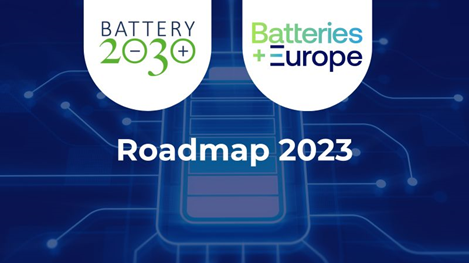Batteries Europe, the European Battery Technology and Innovation Platform, and Battery 2030+, a large-scale and long-term European Battery Research Initiative, recently published their research and innovation roadmaps, which outline the necessary steps to achieve the promise of creating a competitive battery value chain in Europe.
The Batteries Europe Research and Innovation Roadmap highlights critical sectors that require adaptation in the medium and long term to support the development of the entire battery value chain, while providing an overview of key research areas identified for further investigation by the battery research community. The plan presents the necessary measures to address the growing demand for batteries, which are central to the future of sustainable energy. Parts of the plan’s vision incorporate key initiatives of the European Union within the battery ecosystem and define strategic objectives. It also stresses the urgent need to strengthen education and skills development in order to support industry research and development in battery-related areas.
The Battery 2030+ Plan, on the other hand, focuses on long-term research directions. It outlines research actions aimed at revolutionizing battery technology for real-world applications as part of European efforts to establish battery cell manufacturing. It focuses on a chemical approach that can exceed the performance targets set out in the European Commission’s Strategic Energy Technology Plan-SET-Plan. With its research, Battery 2030+ wants to influence not only the current chemical composition of lithium-based batteries, but also post-lithium batteries, semiconductor, silicon, sodium and future chemicals. The Battery2030+ roadmap from a pan-European consultation process presents three overarching research topics and six research areas needed to create a broad toolbox to transform the way batteries are designed and developed.
Both documents will be part of the Strategic Research and Innovation Agenda (SRIA), which will be published later this year, focusing on which research topics of strategic importance for Europe will be proposed for funding in the coming years by the European Union’s research and innovation programme, Horizon Europe.
SRIA falls under the structure of the BATT4EU Co-programmed European Partnership, established under Horizon Europe. The BATT4EU vision is to create the world’s best innovation ecosystem in Europe by 2030 to foster a competitive, sustainable and circular European battery value chain and drive the transition towards a carbon-neutral society.
Co-programmed European Partnerships are partnerships between the European Commission and private and/or public partners. This is a Partnership implemented most often on the basis of a Memorandum of Understanding between the EU and private (or public research) partners associated in one or more associations. The partnership plans its activities in SRIA and creates annual work programmes containing objectives, priorities and planned activities. The main objective of the partnership is to participate together with the EC in the preparation of calls so that they reflect the objectives and priorities of the partnership. The calls prepared in this way are then fully funded and announced under Horizon Europe. This type of partnership requires members to make a financial contribution on an annual basis, but partnership members have privileged and timely access to calls launched under this partnership in Horizon Europe.

